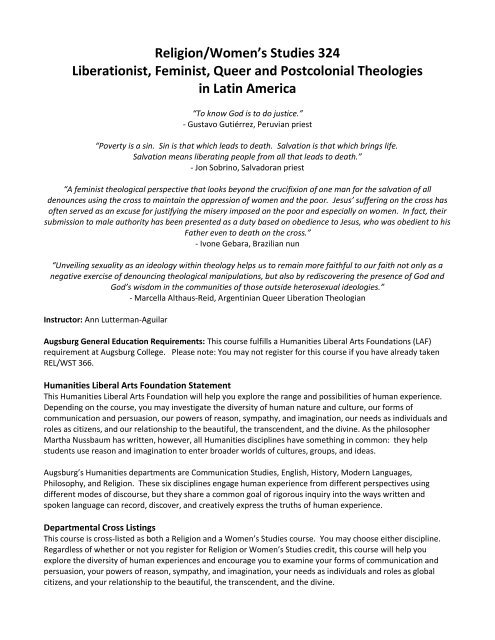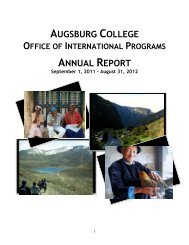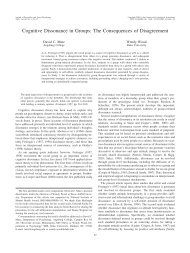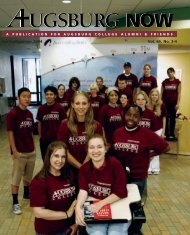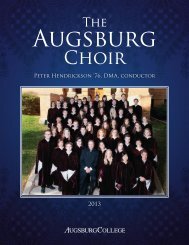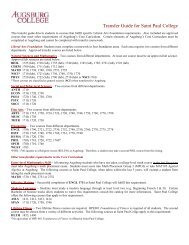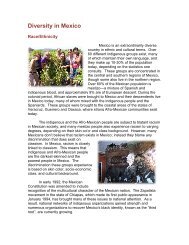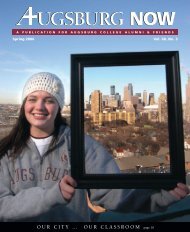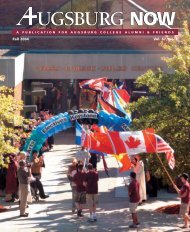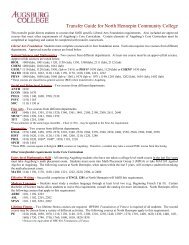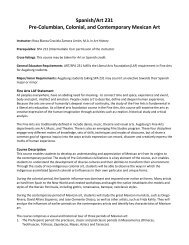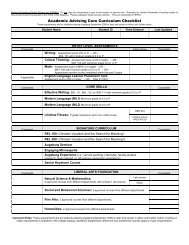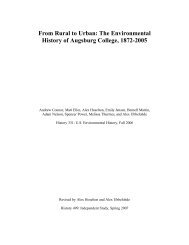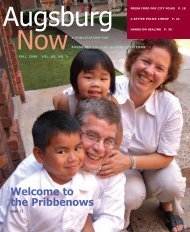Liberationist, Feminist, Queer and Postcolonial ... - Augsburg College
Liberationist, Feminist, Queer and Postcolonial ... - Augsburg College
Liberationist, Feminist, Queer and Postcolonial ... - Augsburg College
You also want an ePaper? Increase the reach of your titles
YUMPU automatically turns print PDFs into web optimized ePapers that Google loves.
Religion/Women’s Studies 324<br />
<strong>Liberationist</strong>, <strong>Feminist</strong>, <strong>Queer</strong> <strong>and</strong> <strong>Postcolonial</strong> Theologies<br />
in Latin America<br />
“To know God is to do justice.”<br />
- Gustavo Gutiérrez, Peruvian priest<br />
“Poverty is a sin. Sin is that which leads to death. Salvation is that which brings life.<br />
Salvation means liberating people from all that leads to death.”<br />
- Jon Sobrino, Salvadoran priest<br />
“A feminist theological perspective that looks beyond the crucifixion of one man for the salvation of all<br />
denounces using the cross to maintain the oppression of women <strong>and</strong> the poor. Jesus’ suffering on the cross has<br />
often served as an excuse for justifying the misery imposed on the poor <strong>and</strong> especially on women. In fact, their<br />
submission to male authority has been presented as a duty based on obedience to Jesus, who was obedient to his<br />
Father even to death on the cross.”<br />
- Ivone Gebara, Brazilian nun<br />
“Unveiling sexuality as an ideology within theology helps us to remain more faithful to our faith not only as a<br />
negative exercise of denouncing theological manipulations, but also by rediscovering the presence of God <strong>and</strong><br />
God’s wisdom in the communities of those outside heterosexual ideologies.”<br />
- Marcella Althaus-Reid, Argentinian <strong>Queer</strong> Liberation Theologian<br />
Instructor: Ann Lutterman-Aguilar<br />
<strong>Augsburg</strong> General Education Requirements: This course fulfills a Humanities Liberal Arts Foundations (LAF)<br />
requirement at <strong>Augsburg</strong> <strong>College</strong>. Please note: You may not register for this course if you have already taken<br />
REL/WST 366.<br />
Humanities Liberal Arts Foundation Statement<br />
This Humanities Liberal Arts Foundation will help you explore the range <strong>and</strong> possibilities of human experience.<br />
Depending on the course, you may investigate the diversity of human nature <strong>and</strong> culture, our forms of<br />
communication <strong>and</strong> persuasion, our powers of reason, sympathy, <strong>and</strong> imagination, our needs as individuals <strong>and</strong><br />
roles as citizens, <strong>and</strong> our relationship to the beautiful, the transcendent, <strong>and</strong> the divine. As the philosopher<br />
Martha Nussbaum has written, however, all Humanities disciplines have something in common: they help<br />
students use reason <strong>and</strong> imagination to enter broader worlds of cultures, groups, <strong>and</strong> ideas.<br />
<strong>Augsburg</strong>’s Humanities departments are Communication Studies, English, History, Modern Languages,<br />
Philosophy, <strong>and</strong> Religion. These six disciplines engage human experience from different perspectives using<br />
different modes of discourse, but they share a common goal of rigorous inquiry into the ways written <strong>and</strong><br />
spoken language can record, discover, <strong>and</strong> creatively express the truths of human experience.<br />
Departmental Cross Listings<br />
This course is cross-listed as both a Religion <strong>and</strong> a Women’s Studies course. You may choose either discipline.<br />
Regardless of whether or not you register for Religion or Women’s Studies credit, this course will help you<br />
explore the diversity of human experiences <strong>and</strong> encourage you to examine your forms of communication <strong>and</strong><br />
persuasion, your powers of reason, sympathy, <strong>and</strong> imagination, your needs as individuals <strong>and</strong> roles as global<br />
citizens, <strong>and</strong> your relationship to the beautiful, the transcendent, <strong>and</strong> the divine.
Primary Texts<br />
Aquino, Maria Pilar <strong>and</strong> María José Rosaldo-Nunes, eds. <strong>Feminist</strong> Intercultural Theology: Latina Explorations for<br />
a Just World. Maryknoll, NY: Orbis Books, 2007.<br />
Althaus-Reid, Marcella. From <strong>Feminist</strong> Theology to Indecent Theology: Readings on Poverty, Sexual Identity <strong>and</strong><br />
God. London: SCM Press, 2005.<br />
Cherry, Kittredge. Art that Dares: Gay Jesus, Woman Christ, <strong>and</strong> More. Berkeley, CA: AndroGyne Press, 2007.<br />
Ress, Mary Judith. Blood Flowers. iUniverse, 2010.<br />
Rivera, Mayra. The Touch of Transcendence: A <strong>Postcolonial</strong> Theology of God. Louisville: Westminster John Knox<br />
Press, 2007.<br />
Tamez, Elsa. Bible of the Oppressed. Eugene, OR: Wipf <strong>and</strong> Stock Publishers, 1982/2006.<br />
Secondary Texts<br />
DeYoung, Curtiss Paul, Wilda C. Gafney, Leticia A. Guardiola-Saenz, George “Tink” Tinker, <strong>and</strong> Frank M. Yamada,<br />
eds. The Peoples’ Bible, New Revised St<strong>and</strong>ard Version with the Aprochypha. Minneapolis: Fortress<br />
Press, 2009. (We will read all of the chapters in “The Bible at the Crossroads,” pages 3-123 <strong>and</strong> the<br />
books of Exodus, Luke, Acts, <strong>and</strong> selected other chapters of the Bible.<br />
Gebara, Ivone. Out of the Depths: Women’s Experience of Evil <strong>and</strong> Salvation. Minneapolis: Fortress Press,<br />
2002. (Selected chapters)<br />
Peterson, Anna L. Martyrdom <strong>and</strong> the Politics of Religion: Progressive Catholicism in El Salvador’s Civil War.<br />
State University of New York Press, 1997. (Selected chapters)<br />
Peterson, Anna L. <strong>and</strong> Vásquez, Manuel A., eds. Latin American Religions: Histories <strong>and</strong> Documents in Context.<br />
New York U. Press, 2008. (Selections from this text. It contains excerpts from Vatican II, Medellín,<br />
Puebla, Frei Betto, Ernesto Cardenal, Gustavo Gutiérrez, Jon Sobrino, letters <strong>and</strong> sermons by Archbishop<br />
Oscar Romero, etc.)<br />
Course Rationale <strong>and</strong> Purpose<br />
The cross <strong>and</strong> the sword: you can’t underst<strong>and</strong> contemporary Latin America without at least a basic<br />
underst<strong>and</strong>ing of these dual forces <strong>and</strong> the complex ways in which religious beliefs have shaped Latin American<br />
history <strong>and</strong> culture. From the indigenous spiritualities of pre-Hispanic times to the Catholicism brought about by<br />
the Spanish conquest to the churches of today, theological perspectives have been used to justify, shape,<br />
maintain, <strong>and</strong> transform gender roles, sexuality, economic structures, nationalities, politics, <strong>and</strong> culture<br />
throughout Latin America. In fact, it would be impossible to fully underst<strong>and</strong> Latin America without a basic<br />
comprehension of the historical roles played by the Roman Catholic Church <strong>and</strong> the multiple impacts of different<br />
theological perspectives on Latin American societies.<br />
Although pontifical theology was used by the Roman Catholic Church in the late 1400s <strong>and</strong> early 1500s in order<br />
to justify Spain’s political, economic <strong>and</strong> religious expansion, many Latin Americans have embraced different<br />
forms of Christianity despite the conflicting imposition of the “the cross <strong>and</strong> the sword” at the time of the<br />
Spanish Conquest. Throughout Latin American history, progressive Catholics <strong>and</strong> Protestant Christians have<br />
often participated in struggles against slavery <strong>and</strong> the oppression of indigenous <strong>and</strong> Afro-Latino peoples, as well<br />
as in independence movements <strong>and</strong> revolutionary movements. The best known movements are revolutionary<br />
movements that took place in Central America in the 1980s <strong>and</strong> the Zapatista movement in Chiapas, Mexico that<br />
became public in 1994 <strong>and</strong> continues today.<br />
Therefore, the purpose of this course is to help you comprehend the complex relationship between theologies<br />
<strong>and</strong> social/political transformation in Latin America <strong>and</strong> the emergence of Christian theologies that seek to<br />
foment human liberation from oppression based on socio-economic class, race <strong>and</strong> ethnicity, gender, sexuality,<br />
<strong>and</strong> culture. We will begin with a very brief examination of pre-conquest indigenous theologies <strong>and</strong> the<br />
theological arguments that were used to suppress indigenous theologies <strong>and</strong> rationalize the conquest <strong>and</strong><br />
colonization of Latin America.
However, the primary focus of the course will be on Latin American Christian theologies of liberation, which<br />
started with Christian reflections on economic <strong>and</strong> political liberation <strong>and</strong> later began to address racial <strong>and</strong><br />
ethnic liberation, women’s liberation, <strong>and</strong> the liberation of lesbian, gay, bisexual, transgendered, <strong>and</strong> queer<br />
(LGBTQ) people. Because women represent more than half of the general population <strong>and</strong> the majority of active<br />
church members, we will pay special attention to theories regarding the social <strong>and</strong> political impacts of diverse<br />
theologies on Latin American women. We will also analyze <strong>and</strong> critique feminist, postcolonial, <strong>and</strong> queer<br />
theologies of liberation in Latin America. Themes of race, ethnicity, nationality, socio-economic class, gender,<br />
<strong>and</strong> sexuality will be woven throughout the whole course.<br />
Throughout the course, you will also be encouraged to reflect upon your own religious <strong>and</strong>/or philosophical<br />
beliefs <strong>and</strong> to deepen your appreciation of religious values <strong>and</strong> theological perspectives that differ from your<br />
own. In addition, special attention will be given to critical thinking, which is defined as “an investigation whose<br />
purpose is to explore a situation, phenomenon, question, or problem to arrive at a hypothesis or conclusion<br />
about it that integrates all available information <strong>and</strong> that can therefore be convincingly justified” (Kurfiss 1988,<br />
2). The goal is for you continue to develop skills of analysis, critique, <strong>and</strong> evaluation, <strong>and</strong> to present your own<br />
beliefs, viewpoints, <strong>and</strong> positions to others.<br />
You will use <strong>and</strong> develop your critical thinking skills by analyzing, critiquing <strong>and</strong> evaluating competing claims<br />
regarding each of the theological perspectives addressed in the course. One of your first tasks in this course is<br />
to underst<strong>and</strong> <strong>and</strong> identify the different types of claims – i.e., beliefs, assertions, positions, theses, <strong>and</strong><br />
hypotheses - that are made in the fields of Religious Studies <strong>and</strong> Women’s Studies. While certain authors <strong>and</strong><br />
guest speakers who address the course make theological assertions regarding beliefs, other authors are make<br />
claims <strong>and</strong> assertions about the nature of religion itself. Therefore, before you can analyze the claims made by<br />
these authors <strong>and</strong> guest speakers, you must first learn to distinguish between these different genres <strong>and</strong> to<br />
identify the author or speaker’s intended audience <strong>and</strong> purpose.<br />
Upon completion of the course, you should be able to demonstrate proficiency in each of the following critical<br />
thinking skills: 1) the identification, knowledge, <strong>and</strong> comprehension of other people’s theological claims, beliefs,<br />
<strong>and</strong> assertions, as well as political <strong>and</strong> sociological claims regarding the role of religion; 2) the analysis,<br />
interpretation, <strong>and</strong> evaluation of other people’s claims; 3) the assessment of competing claims; 4) the<br />
development of your own claims; <strong>and</strong> 5) the presentation of your own claims. Please note that you who seek to<br />
use this course to fulfill your Critical Thinking skill requirement at <strong>Augsburg</strong> <strong>College</strong> must obtain an average of at<br />
least 73% for the Critical Thinking Exercises <strong>and</strong> for the final course grade.<br />
Teaching Methodology, Pedagogy, <strong>and</strong> Ethics<br />
Teaching strategies include numerous lectures; small <strong>and</strong> large group discussions of required readings <strong>and</strong><br />
experiences; films; artwork <strong>and</strong> music which express course-related themes; field trips; guest lectures <strong>and</strong><br />
conversations with a wide range of Mexicans expressing diverse viewpoints; participant observation; <strong>and</strong><br />
spontaneous writing exercises in class. Particular attention is given to story-telling, particularly by members of<br />
groups whose voices have been silenced. In addition, when scheduling guest speakers <strong>and</strong> other encounters,<br />
priority is given to women <strong>and</strong> to other individuals <strong>and</strong> groups who have been marginalized <strong>and</strong> underrepresented<br />
in academia.<br />
Due to the fact that approximately half of class time is spent listening to guest speakers, you are encouraged to<br />
develop your strategic questioning <strong>and</strong> listening skills. It is very important that you ask informed questions <strong>and</strong><br />
share your own interests, opinions, <strong>and</strong> experiences with speakers so that they are not just educational<br />
consumers but partners in a common quest to learn more about social change. During internal class discussion<br />
sessions (those not involving guest lectures or excursions), I will try to apply principles of experiential, critical,<br />
<strong>and</strong> feminist pedagogies by encouraging you to reflect upon both cognitive <strong>and</strong> affective learning <strong>and</strong> to draw<br />
upon your own prior life experiences, as well as new experiences in Mexico.
Liberation <strong>and</strong> Social Change Lab Group<br />
You will be asked to consider your own group of co-learners as a social change “laboratory,” as many of the<br />
same issues that require liberation <strong>and</strong> social change in society at large can be found within the smaller<br />
microcosms of learning groups. Therefore, in addition to our regular weekly internal class sessions, “social<br />
change lab groups” will meet approximately once/week throughout the semester. Active participation in the lab<br />
group includes planning <strong>and</strong> facilitating (or co-facilitating) at least one hour of a lab group session in<br />
coordination with the T.A. You will sign up near the beginning of the semester. At least 48 hours prior to the<br />
lab group session, you must submit a short proposal that outlines the topic(s) you plan to address <strong>and</strong> the<br />
specific lab group objectives you will fulfil. You will then meet with your T.A. to discuss the proposal <strong>and</strong> plans<br />
for the session. At the time of the session, you must submit a one-page outline. The T.A. <strong>and</strong> other you will be<br />
asked to complete a short feedback form at the end of the session, <strong>and</strong> you will be expected to submit your own<br />
completed self-assessment form. Be sure to read the separate h<strong>and</strong>out about the Liberation <strong>and</strong> Social Change<br />
Lab Groups.<br />
Course Units<br />
I. I Pre-Colombian Mesomerica <strong>and</strong> the Spanish Conquest<br />
II. From the Spanish Conquest to the 1st Generation of Latin American Liberation Theology: Responses to<br />
Economic <strong>and</strong> Political Oppression<br />
III. Methodology <strong>and</strong> Biblical Interpretation in Early Latin American Liberation Theologies<br />
IV. Indigenous <strong>and</strong> Afro-Latino Theologies of Liberation<br />
V. Latin American <strong>Feminist</strong> Theologies <strong>and</strong> Biblical Interpretation<br />
VI. <strong>Postcolonial</strong> Theologies of Liberation<br />
VII. Latin American “Indecent” <strong>and</strong> <strong>Queer</strong> Theologies of Liberation<br />
VIII. Applying Latin American Liberation Theologies to Your Own Context: Migration, Globalization, <strong>and</strong> Other<br />
Issues<br />
Learning Objectives/Outcomes<br />
By the end of the course you should be able to:<br />
1. Identify the key characteristics of the first generation of Latin American liberation theologies - theologies<br />
addressing economic, political, <strong>and</strong> racial/ethnic liberation.<br />
2. Articulate the beliefs <strong>and</strong> theological methods that distinguish feminist, queer, <strong>and</strong> postcolonial Latin<br />
American liberation theologies from the first generation <strong>and</strong> from each other.<br />
3. Analyze biblical hermeneutics in each current of Latin American liberation theology.<br />
4. Evaluate prominent critiques of each current of Latin American liberation theology.<br />
5. Analyze the complex relationship between Latin American liberation theologies <strong>and</strong> movements for social<br />
change, including movements that seek to improve the quality of women’s lives <strong>and</strong> movements that<br />
advocate gender equality.<br />
6. Demonstrate your ability to find meaning in a written, visual, or spoken text by identifying different genres<br />
of both written <strong>and</strong> oral texts (rhetorical, literary, or other), identify the speaker’s or author’s thesis <strong>and</strong>/or<br />
theme, discern how the speaker or author develops <strong>and</strong> supports her or his arguments, <strong>and</strong> accurately<br />
paraphrase the main points in your own words.<br />
7. Articulate what you have learned about the diversity of Mexican <strong>and</strong> other Latin American cultures <strong>and</strong> their<br />
religious belief systems or woldviews.<br />
8. Explain the diverse ways that Latin American liberation theologians underst<strong>and</strong> the social construction of<br />
race, ethnicity, nationality, <strong>and</strong> socio-economic disparity in their contexts.<br />
9. Analyze dominant features of U.S. culture <strong>and</strong> spirituality, including individualism, through a Latin American<br />
liberationist lens.<br />
10. Demonstrate improvement in your critical thinking skills through ongoing analysis, critique <strong>and</strong> evaluation of<br />
competing claims regarding Latin American theologies of liberation.
11. Compare <strong>and</strong> contrast Latin American liberation theologies with the theology <strong>and</strong>/or philosophy to which<br />
you were exposed as a child.<br />
12. Reflect on <strong>and</strong> critically discuss respect for human diversity <strong>and</strong> difference in religious, philosophical, <strong>and</strong><br />
cultural approaches, thought patterns, <strong>and</strong> values.<br />
13. Articulate your underst<strong>and</strong>ing of the relationship between faith <strong>and</strong> reason.<br />
14. Develop <strong>and</strong> present your own position on each of the primary currents within Latin American liberation<br />
theology.<br />
15. Employ theological arguments to advocate effectively <strong>and</strong> with integrity in favor of or against a political or<br />
social cause you learned about while in Mexico or Latin America.<br />
16. Record <strong>and</strong> reflect on your aesthetic response to experiences in Mexico <strong>and</strong> El Salvador.<br />
17. Reflect on the ways in which Latin American liberation theologies affirm, challenge, <strong>and</strong>/or change your own<br />
beliefs <strong>and</strong> praxis as a person who lives in the United States – particularly with regards to concerns about<br />
migration, emigration, <strong>and</strong> globalization.<br />
18. Create original work in a genre of creative written, visual, or oral expression that expresses your position on<br />
one of the prominent currents of Latin American liberation theologies that we studied over the course of the<br />
semester.<br />
Course Requirements (100%)<br />
1. Class Participation <strong>and</strong> Portfolio (20%): Effective class participation includes not only regular<br />
attendance but also active participation in class sessions involving guest lectures <strong>and</strong> excursions, internal<br />
class sessions, <strong>and</strong> lab group sessions, as well as completion of a portfolio of all your work. Please note<br />
that class participation is required for a passing grade. Because participation is essential to the learning<br />
process, if you miss class activities for any reason you must speak to me prior to class <strong>and</strong> make<br />
arrangements to complete a short assignment. Absences due to religious holidays <strong>and</strong> illness are<br />
considered excused absences. However, you still must inform me of such absences in advance <strong>and</strong> talk<br />
to me about how to make up the missed session/s. You are also responsible for obtaining notes,<br />
h<strong>and</strong>outs, <strong>and</strong> announcements from other you if they arrive late to class or miss a class session.<br />
Absences for personal travel or visits from family or friends are not excused absences. Your class<br />
participation grade includes:<br />
Active Participation in Class Sessions Involving Guest Speakers <strong>and</strong>/or Excursions<br />
Active Participation in In-House Class Sessions<br />
Active Participation in Lab Group <strong>and</strong> Facilitation of a 1-Hour Session of Lab Group<br />
Completion of your Learning Portfolio (see h<strong>and</strong>out)<br />
Group Blog <strong>and</strong> Photo-Essay: You will be expected to create <strong>and</strong> post at least two blog entries with<br />
photos that enable you to “pay it forward” by sharing what you are learning from guest speakers in<br />
Mexico <strong>and</strong> El Salvador with people back home. Your entries should focus on what you are learning<br />
about 1) the diversity of Mexican <strong>and</strong> other Latin American cultures <strong>and</strong> their religious belief systems or<br />
woldviews <strong>and</strong> 2) dominant features of U.S. culture <strong>and</strong> spirituality, as they compare <strong>and</strong> contrast with<br />
Mexican <strong>and</strong> other Latin American cultural <strong>and</strong> religious values.<br />
2. Critical Thinking Exercises (10%): You will be given five critical thinking exercises in which you will be<br />
expected to identify the genre of the written or oral text, (rhetorical, literary, or other), identify the<br />
speaker’s or author’s thesis <strong>and</strong>/or theme, discern how the speaker or author develops <strong>and</strong> supports her<br />
or his arguments, <strong>and</strong> accurately paraphrase the main points in your own words.<br />
3. Exam #1 on the 1st Generation of Latin American Liberation Theologies (20%): You will complete a<br />
two-part exam. In the first section, you will be asked to provide short answers to questions about the<br />
emergence of the first generation of Latin American liberation theologies, their prominent proponents<br />
<strong>and</strong> beliefs, their interpretation of the Bible, key critiques of such theologies, <strong>and</strong> the relationship<br />
between Latin American liberation theologies <strong>and</strong> movements for social change. In the second section,<br />
you will write a short essay in which you articulate your own position about the strengths <strong>and</strong>/or<br />
weaknesses of early Latin American liberation theologies that focused on economic, political, <strong>and</strong><br />
racial/ethnic liberation.
4. Advocacy <strong>and</strong>/or Educational Project <strong>and</strong> Oral Presentation on Liberation Theology (10%): Upon<br />
return from the 10-day seminar in El Salvador, you will develop <strong>and</strong> present a creative project that<br />
enables you to articulate your own answer to the question: “Why does what you believe matter” You<br />
may use the visual arts, music, creative writing, or another form of creative expression to educate<br />
people back home about 1) the relationship between faith <strong>and</strong> reason, 2) the relationship between<br />
theology <strong>and</strong> politics, <strong>and</strong> 3) the impacts of liberation theologies on diverse people you met in El<br />
Salvador with regards to nationality, race, socio-economic class, ethnicity, gender, <strong>and</strong>/or sexuality. You<br />
must identify your target audience, <strong>and</strong> you will be graded on your effectiveness in developing <strong>and</strong><br />
presenting your ideas to your chosen audience.<br />
5. Exam #2 on <strong>Feminist</strong>, <strong>Queer</strong>, <strong>and</strong> <strong>Postcolonial</strong> Liberation Theologies (20%): In the second exam you<br />
will be asked to explain the key beliefs <strong>and</strong> methodologies of feminist, queer, <strong>and</strong> postcolonial liberation<br />
theologies in your own words, drawing on examples from speakers <strong>and</strong> texts. You will also be asked to<br />
articulate what distinguishes feminist, queer, <strong>and</strong> postcolonial Latin American liberation theologies from<br />
the first generation of Latin American liberation theologies <strong>and</strong> from each other. Finally, you will be<br />
asked to argue your own position regarding the current of contemporary Latin American liberation<br />
theology that you find most affirming <strong>and</strong>/or challenging of your own beliefs.<br />
6. Final Creative Project <strong>and</strong> Oral Presentation (20%): Given that Latin American liberation theologies are<br />
contextual theologies that seek to foment human liberation from oppression, throughout the semester<br />
you are expected to analyze <strong>and</strong> reflect upon your own context back home <strong>and</strong> explore the ways in<br />
which feminist, queer, <strong>and</strong> postcolonial feminist theologies could provide clues to liberating action<br />
within that particular context. For your final project, you should draw on that semester-long exploration<br />
<strong>and</strong> design a creative project that will help you employ theological arguments to advocate effectively<br />
<strong>and</strong> with integrity in favor of or against a political or social cause impacting your own community.<br />
You will be given more detailed information about each assignment <strong>and</strong> a schedule of required readings, class<br />
discussion topics, <strong>and</strong> assignments on the first day of class.


